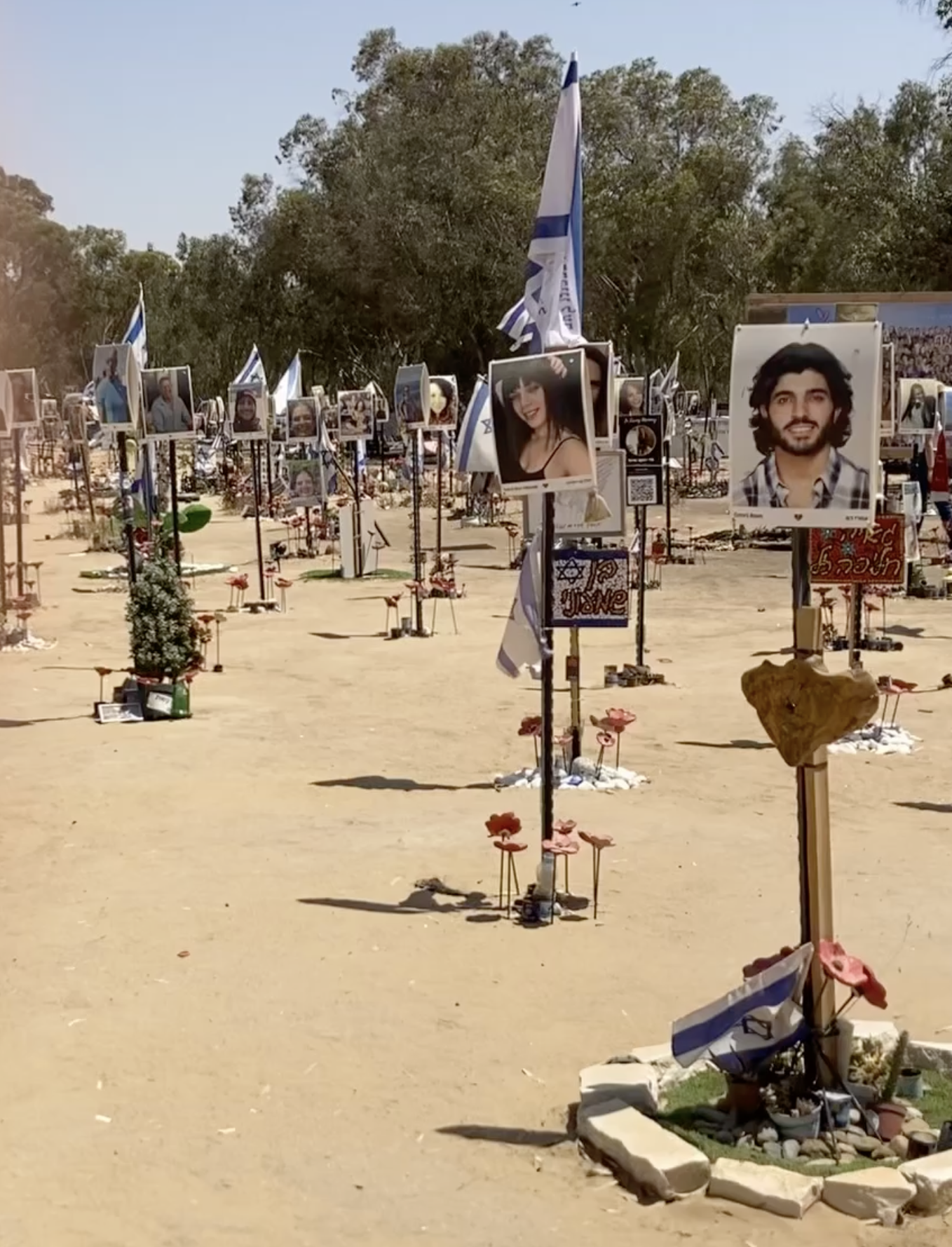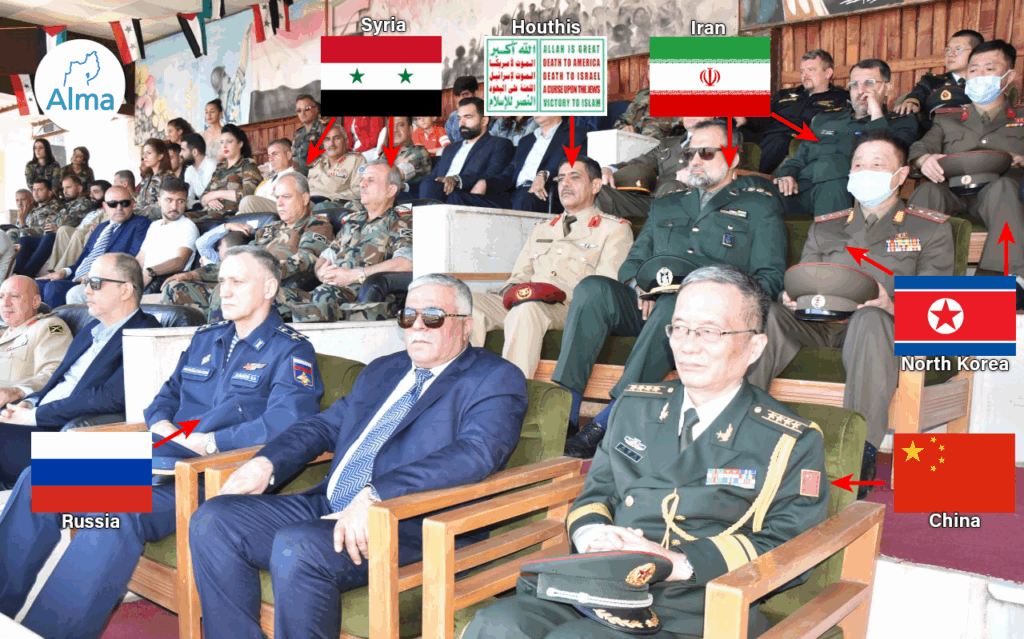Reminders of war and the fate of the hostages are constant, beginning with the arrivals terminal at Ben-Gurion Airport (photographed by yours truly). I returned from Israel on June 27th after a visit of about 12 days. It began with my synagogue’s four and a half-day solidarity tour, and stayed on for another week, mostly visiting relatives and catching up with a couple of friends.
The phenomenon of “solidarity tourism” is viewed critically in a recent article in Jewish Currents (“The Rise of October 7th Tourism“). The writer, Maya Rosen, amply substantiates how difficult it is for witnesses of the devastation on the Israeli side to feel compassion for what the Palestinians are going through. Yet it is natural for Jews and other pro-Israel observers to feel solidarity with an embattled Israel. The trick is to feel compassion and understanding for both sides, something that Jewish Currents in its current anti-Zionist editorial incarnation finds difficult, if not impossible.
Solidarity tours are generally intended to strengthen ties between Israel and the Jewish Diaspora, as well as with non-Jews, but good ones are also about fact-finding, open to a variety of viewpoints and wary of obvious propaganda. Ours strove to be non-propagandistic, as it included presentations and activities with anti-government figures, such as an opposition Member of Knesset (Labor MK Gilad Kariv, who happens also to be a Reform rabbi) and some anti-Netanyahu social activists. Still, as one of our number noted in her internally shared summary, there was something glaringly missing: “No attempt was made to include any information about what is occurring in the West Bank.”
The ‘Gaza Envelope’
Our “tourism” began by visiting two sites of the October 7th attacks on the so-called Gaza Envelope. There were occasional booms of explosions and the buzzing of a drone in nearby Gaza.
Our guides at Kfar Aza told us that Hamas knew exactly where to strike. They had intelligence (probably taken from Gazan day laborers) that the kibbutz stored most of its weapons in a building near the synagogue. Paragliders shot down people rushing to the armory, and knew to concentrate their attack on the neighborhood that housed young couples.

Next was the site of the Nova music festival, where 364 people were slaughtered. A survivor of the attack, Amit Musaei (a poet and DJ), explained that he was enjoying the performance at a different stage than three of his friends when the rocket assault began. His friends went to a bomb shelter, thinking of this as a different kind of attack, only to be gunned down when Hamas moved in on the ground. Musaei learned that the major roadway out was interdicted by terrorists who shot up cars attempting to flee; he relied on his All Wheel Drive vehicle to escape in a circuitous off-road route.

Speakers & Presentations
Among those who met with my synagogue group was an older couple, Jaqui and Yaron Vital, speaking of their kibbutznik daughter, Adi Vital Kaploun, killed on October 7th after killing one of the attackers. Her body was booby-trapped, but her father survived because the grenade attached to the door of her safe room failed to explode when he opened it. Adi’s two young boys (the older not yet four plus a half-year old toddler) saw their mother die and were abducted to Gaza with a neighbor, but they were let go in a filmed Hamas propaganda ploy.
We also heard from Major (Res.) Avraham Levine, a speaker from the Alma Research & Education Center on the anti-Israel axis of movements supported by Iran, and their collective alliance with Russia, China and North Korea. I am skeptical of seeing Iran as the root of all evil, and believe that Trump made a serious error in negating the Obama administration’s nuclear agreement with Iran. But I found Major Levine’s presentation persuasive on the Islamic Republic’s malign influence, arguably forging an “axis of evil,” as illustrated in a slide, duplicated below, of a recent ceremony conducted by Assad’s Syrian army; guests of honor included uniformed officers and officials as identified from Russia, Iran, China, North Korea, and the Houthis. Hezbollah is also part of this alliance.

Still, being an inveterate liberal, I asked Levine what might have happened if Israel had not prolonged its stay in Lebanon after the 1982 invasion had forced Arafat and the PLO out of “Fatahland” (as its armed occupation of Southern Lebanon was known) and out of their final bastion in Beirut to exile in Tunisia. I can’t prove anything with my retroactive speculation, but he agreed with me that Lebanese Shiites were not enemies of Israel at the outset of that war, and that Hezbollah was not even the main Shiite organization at the time (there was a more moderate group called Amal).
In a visit to the Knesset, we met with MK Kariv. I prompted him to speak of Labor’s new leader, Yair Golan, a retired general and one time Meretz MK, who was a hero of October 7th, saving many people fleeing the Nova music festival. He’s renamed the party list, “the Democrats,” and will run with Meretz and others, hopefully providing a reinvigorated leftwing presence in the Knesset.
Dissenting Views on the Right and Left
We also heard from Haviv Rettig Gur, a reporter for the Times of Israel who downplayed civilian losses within the Gaza Strip — arguing that although a “tragic” situation, the count is unreliable and doesn’t distinguish between combatants and non-combatants. Gur’s skeptical view of the level of suffering in Gaza, although partially correct (statistics of civilian deaths are impossible to verify), was unsettling.
It would have been easier to take if he had begun with acknowledging the tragedy, even if “only” a few thousand children have died, rather than the 14,000 or so claimed; instead this modicum of compassion came out as an afterthought. He had nothing to say on how devastated Gaza is, with its infrastructure and housing stock mostly destroyed.
Nor was he credible in contending that Israel was able to quickly move hundreds of thousands of Gazans around because they knew they would be supplied with food upon arrival, rather than simply terrified of attack if they didn’t move. He also totally rejected claims of famine or impending famine, despite the good-faith observations of such humanitarian actors as Cindy McCain, head of the World Food Program.
In keeping with our organizers’ effort to expose us to a variety of views, we were also addressed by Ephraim Shoham-Steiner, a professor of medieval Jewish history who is a leader of HaSmol Emuni (the “faithful left”), a new organization of politically liberal Orthodox religious activists. He’s so disgusted by the extreme nationalist direction of most religious Zionists that he no longer wears the emblematic knitted kippa in everyday public life — other than in prayer or when studying religious texts. He also dons a kippa when speaking to groups such as ours or addressing political rallies, to emphasize that being an Orthodox Jew doesn’t automatically mean that you’re on the right, let alone an extremist.
Some Takeaways
My overall impression of Israel is of a country that is seriously challenged by its situation, but far from depressed. For example, Tel Aviv nightlife remains active. In March of this year, Israel ranked fifth out of 143 countries evaluated in the World Happiness Report, despite the war. But Prime Minister Netanyahu is widely blamed for the October 7th debacle and generally rejected in election polls; this was true even for relatives of mine who expressed rightwing opinions regarding the Palestinians.
Anti-Netanyahu rallies in favor of negotiating a deal to release the hostages have started again around the country. Although tiny compared to those in Tel Aviv and Jerusalem, I attended one in the Galilee city of Nahariya. The most common word I heard chanted was busha, “shame,” aimed at Netanyahu. One jaundiced participant, however, suggested that this word doesn’t work, because “Netanyahu has no shame.”
Ralph Seliger